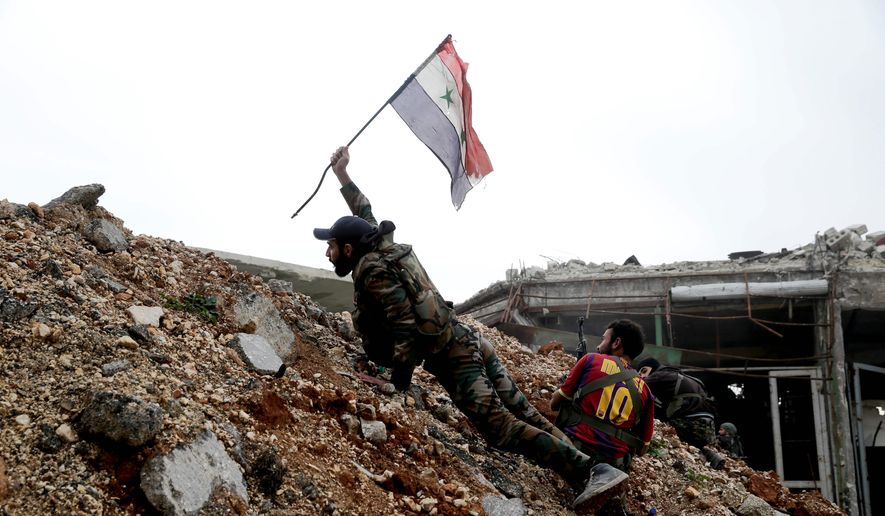The fall of the rebel-held Syrian city of Aleppo to Russian- and Iranian-backed forces loyal to President Bashar Assad sounds the death knell for the outgoing Obama administration’s hands-off counterterrorism doctrine, analysts say.
The final batches of anti-Assad fighters vacated formerly rebel-held areas of eastern Aleppo on Friday, officially bringing the city — which was Syria’s economic and cultural hub before the war — under the regime’s control.
The fall of Aleppo was the biggest victory for government forces and their Russian and Iranian supporters since moderate rebel groups, emboldened by regional uprisings tied to the 2011 Arab Spring, attempted to overthrow the Assad regime and ignited the war six years ago.
But the fall was also a pivotal moment for the Obama administration, whose initial intractable stance against the Assad regime was translated into an indecisive policy aimed at defeating or sidelining America’s adversaries from a distance.
“There is no doubt [President Obama] will be hammered in historical terms. The question will be why he didn’t do more,” Aaron David Miller, a former presidential adviser on Middle East affairs, told Reuters.
Mr. Obama’s infamous “red line” warning in 2012 against Syria’s use of chemical weapons against rebel forces pushed Washington and Damascus onto a collision course, with U.S. warships anchored off of the Syrian coast ready to launch missiles on government targets.
In the end, the White House held its fire and a the U.S. and Russia brokered a disarmament plan to remove Mr. Assad’s chemical stockpiles.
Administration officials hailed the deal as a diplomatic breakthrough. White House critics, including Donald Trump, characterized the move as a sign of U.S. weakness in the international community.
The Obama administration’s approach to the ripple effects of the Arab Spring, which irrevocably changed the political landscape of the Middle East and North Africa, was tantamount to “a policy of calculated dithering,” said one top regional analyst.
Mr. Obama and his national security staff “just agonized over the [policy] choices until they no longer existed” in Syria, Yemen and Libya, Emile Hokayem, a senior fellow at the International Institute for Strategic Studies, told the Reuters news agency.
Even as the Russian-brokered chemical disarmament plan progressed, the White House embarked on clandestine efforts to train and arm moderate factions of the Syrian opposition.
The U.S. training mission in Syria, as well as efforts assist local forces in Yemen and Libya, were the main underpinnings of Mr. Obama’s counterextremist strategy.
Heavy reliance on local armies and paramilitary groups, trained and armed by small U.S. special operations teams and backed by American surveillance drones and air power, has been the administration’s modus operandi in battling al Qaeda, the Islamic State and other terrorist groups worldwide.
Early into Mr. Obama’s second term, initial reports on U.S. involvement in Libya and Syria were challenging but trending positive. The administration held up the American counterterrorism mission against al Qaeda’s Yemeni cell, deeply rooted in support for local forces and offensive drone strikes, as the standard-bearer for the White House’s strategy.
But after Mr. Obama’s inaction in Syria, the strategy showed signs of cracking. Syria and Libya training missions were canceled after the millions of dollars invested yielded only a few hundred fighters.
The multiple programs led by the U.S. military and intelligence community fell flat, and terrorist groups such as al Qaeda and the Islamic State rushed in to fill the vacuum.
The Yemeni mission derailed after the 2015 ouster of President Abed Rabbo Mansour Hadi. Since then, government factions loyal to the deposed regime, supported by several Gulf states, have been battling Iran-backed Houthi forces for control.
U.S. and British forces have backed Saudi Arabia’s role in the pro-government forces fighting in Yemen. But Washington pared back its support of Saudi forces this month after British Defense Minister Michael Fallon acknowledged the Saudis’ use of cluster bombs, which are banned by the international community.
Mr. Obama, who vowed to reach out to the Arab world when he was elected, is spending his final days in office largely out of sync with the tumultuous region.
“Gulf Arabs have looked to America and its allies for protection in the Middle East. But the region appears to be ’America-less’ in the waning days of the Obama administration,” said Theodore Karasik, a senior adviser to the Dubai-based Gulf State Analytics regional consultancy group.
“The Obama legacy is tarnished,” Mr. Karasik said in an op-ed for Al Arabiya news.
But Mr. Karasik said the Obama legacy did have one bright spot: The administration’s strategy of leaning on indigenous forces rather than putting U.S. boots on the ground empowered Arab nations against the threat of extremism.
The Obama doctrine emboldened Gulf allies “to step out on their own by forcing them to defend themselves from state and non-state threats,” he said.
“To be sure, [Gulf] states need American military technology and support, but politically the tide can continue to where [these] states stand up for themselves and fight their own regional battles based on their own realpolitik,” Mr. Karasik said.
• Carlo Muñoz can be reached at cmunoz@washingtontimes.com.




Please read our comment policy before commenting.